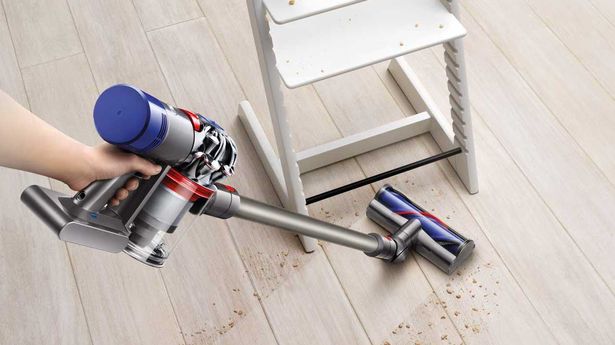
Should You Leave Dyson Plugged In All The Time?
Cleaners Talk is reader-supported. This post contains affiliate links, we may earn a commission at no additional costs to you. As an Amazon Associate we earn from qualifying purchases.
Most people assume it is bad to leave an electrical appliance plugged in all the time because it can overcharge and damage its battery. This begs the question, can you leave your Dyson vacuum on charge all the time?
Whether it is your Dyson V6, V7, V8, V10, or V11, it is completely safe to leave your vacuum on charge all the time. In fact, the battery is designed to be left on charge permanently to ensure that the Dyson vacuum is fully charged when it's next used.
By the end of this post, you should be able to take care of your Dyson vacuum cleaner and prolong its battery life thanks to the tips we share below. So get your Dyson ready and let’s get started.
Can I Leave my Dyson plugged in all the time?
Dyson upright vacuum cleaners (V6, V7, V8, V10, and V11) are designed so that you can store the unit on the charger and keep it plugged in all the time. Storing the Dyson vacuum on the charger will not harm the battery. It is also not necessary to use the unit until the battery is depleted.
A Dyson vacuum cleaner uses a lithium ion battery. Unlike nickel metal hydride batteries, lithium ion batteries do not experience the memory effect (holds less charge over time after being repeatedly recharged), so they can be charged any time, no matter what the state of charge is.
Nickel metal hydride batteries, on the other hand, can develop a memory. They gradually lose their maximum energy capacity if they are repeatedly recharged after being only partially discharged. The battery appears to "remember" the smaller capacity. Over time, they will hold less charge.
A nickel metal hydride battery should be run down, charged fully and then unplugged.
What makes the Dyson vacuum cleaner’s battery unique
While their vacuum cleaners are expensive, buying a Dyson can be considered an investment. One reason why is due to their unique and high-quality battery. Here are 4 reasons why Dyson batteries are unique:
1. Safe management system
The Dyson vacuum’s safe management system comes with a unique battery-saving trigger that helps maximize run time – only using power when you need it. It ensures the battery does not overheat or overcharge and catch fire.
2. No memory effect
Some batteries are engineered with a memory effect. So if you charge a battery for a short period of time, it may only hold a small amount of charge the next. With no memory effect, the lithium ion batteries found in Dyson vacuums are adaptable to their environment, regardless of their charge cycle.
3. Tested again and again
Dyson batteries undergo over 2,000 hours of rigorous testing, to strike the balance between energy density, power density and lifespan. The battery cells are uniquely capable – made to meet their particular demands.
4. Lightweight yet powerful
Their specially-tuned batteries are engineered from lithium-ion, a powerful and lightweight material – designed with high safety, power and energy in mind (unlike nickel-hydride batteries).
Making the most out of Dyson vacuum batteries
Although Dyson engineers their vacuums to be simple and easy to look after, their batteries contain complex chemical structures that reach to their environment. Here are 5 tips to prolong a Dyson vacuum’s battery life:
1. Use high power mode less
Your Dyson vacuum is designed to be used in Auto or Normal mode for everyday cleaning. These can be found and changed at the top or back of your Dyson vacuum.
Max or Boost modes are meant for powerful, intensive bursts of spot cleaning.
However, using them constantly speeds up degradation of the battery. To prolong the battery life, use the high power mode less. If your machine has Eco mode, use it to maximize the battery life.
2. Avoid use in extreme heat temperatures
Hot environments speed up battery aging.
Avoid cleaning the car in hot weather or leaving your Dyson in rooms that get direct sunlight for prolonged periods. The same goes for cold porches and garages in the winter.
3. Store your vacuum at room temperature
Heat sources, such as radiators, can damage the battery. We recommend that you store your vacuum at temperatures between 64°F–82°F (18°C–28°C), away from direct sunlight and out of utility closets.
4. Let it cool, but not too much
You can preserve the life of your Dyson vacuum’s battery by letting your machine cool down after use – before connecting it back up to the dock to recharge. Your machine won’t operate or charge if the room temperature is below 37°F. This is designed to protect both the motor and battery.
5. Give it a break
By letting the battery run down to empty at least once a month, you'll help to prolong its life. If you have a spare battery, it's better you swap them out from time to time, so they both have time to naturally discharge.
Final words
Now you know whether you can leave your Dyson vacuum on charge all the time or not.
Remember, all batteries differ from one another, affecting the amount of power they can produce. The run time can be affected by the cleaning mode you use and the different power draw on varied surfaces. For example, long-pile carpets draw more power than short-pile carpets.
You can help preserve the run time and overall life of your Dyson battery by using the power mode best suited for your cleaning task, and only using Boost mode for intensive cleaning and stubborn stains.
Related posts:
